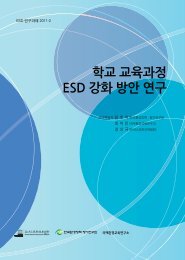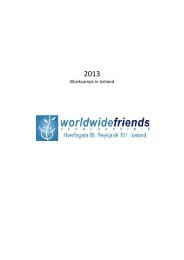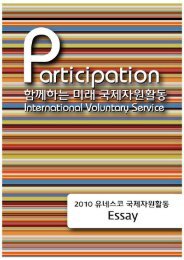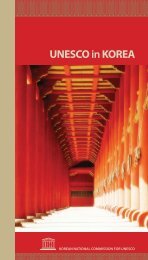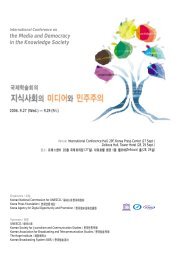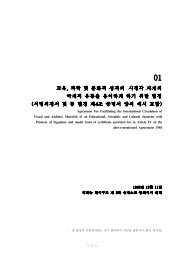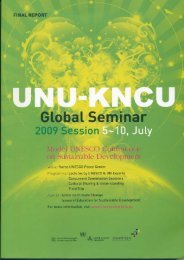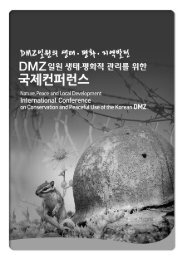íëìë³´ë2012문íì ë°ì ë¼ì´ëí ì´ë¸.pdf - ì ë¤ì¤ì½íêµììí
íëìë³´ë2012문íì ë°ì ë¼ì´ëí ì´ë¸.pdf - ì ë¤ì¤ì½íêµììí
íëìë³´ë2012문íì ë°ì ë¼ì´ëí ì´ë¸.pdf - ì ë¤ì¤ì½íêµììí
Create successful ePaper yourself
Turn your PDF publications into a flip-book with our unique Google optimized e-Paper software.
Lynne Patchett was appointed Chief of Executive Office, UNESCO Culture Sector in<br />
November 2010. The Culture Sector focuses on promoting the role of culture for sustainable<br />
development and social cohesion; recognizing and promoting cultural diversity; and<br />
conserving culture in its various forms. Her previous responsibilities included working at the<br />
UNESCO Office of the Director-General, serving under both Irina Bokova and Koïchiro<br />
Matsuura, and the World Heritage Centre. Prior to joining UNESCO in 2001, her<br />
professional experience included working as a civil servant in the United Kingdom – dealing<br />
with a wide range of issues including local government reform, tourism, and media policy.<br />
Earlier in her career, she was a teacher at the Natural History Museum and at a number of<br />
inner city schools in London. She was born and brought up in Sheffield, UK and was<br />
educated at the Goldsmiths College, University of London and Rutgers University.<br />
Hendrik Van der Pol<br />
UNESCO Institute for Statistics<br />
<br />
<br />
<br />
<br />
<br />
<br />
<br />
<br />
<br />
<br />
<br />
<br />
Hendrik van der Pol, born in the Netherlands, has a degree in human geography and a<br />
doctorate in demography. He has collected and analyzed data from censuses, surveys, and<br />
registration systems in Africa, Asia, Latin America, and South Eastern Europe for the past 30<br />
years. This provided him with a valuable multicultural experience, as well as an in-depth<br />
knowledge in using quantitative methods in policy development, especially in developing<br />
countries. He was the Director of SNV, a Dutch development organization, in Albania (1993-<br />
1997) and Bolivia (1997-2000). In 2000 – 2004 he was a representative of the United Nations<br />
Population Fund (UNFPA) in Guatemala, where he was involved in the Guatemala 2002<br />
population and housing census. In 2004 – 2006, he was the UNFPA representative in India<br />
and Bhutan and managed the seven offices of the organization. Since April 2006, he has been<br />
working as the Director of the UNESCO Institute for Statistics in Montreal. He has written on<br />
various subjects such as population statistics, demography, migration, and reproductive health.<br />
He is a member of the International Union for the Scientific Study of Population and the<br />
Canadian Cultural Observatory Advisory Council.



